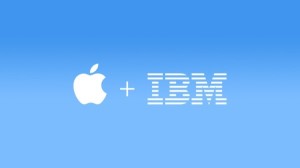 The first products from Apple’s mobile enterprise partnership with IBM will roll out next month, according to Apple CEO Tim Cook, who said the partnership “could change the way people work.”
The first products from Apple’s mobile enterprise partnership with IBM will roll out next month, according to Apple CEO Tim Cook, who said the partnership “could change the way people work.”In July, Apple announced a deal with IBM in which iPhones and iPads would be sold to enterprises backed by IBM’s cloud and analytics services. The first products will be for the banking, government, insurance, retail, telecommunications and travel and transport sectors, Cook said on a Monday earnings call.
Apple did not share specific products details, but the one-time PC rivals are working closely together. IBM is creating iOS-specific security, analytics and management tools and will resell iPhones and iPads. Apple will roll out new support services for businesses.
First out of the gate will be a set of iOS apps, according to Roger Kay, principal analyst at Endpoint Technologies Associates.
“From what I understand, those products will be IBM apps developed with some help from Apple,” Kay said.
The deal was viewed as an odd marriage between the companies, but could help both. Apple hasn’t had great luck with enterprises, while IBM is trying to expand its mobile footprint, Kay said.
The deal could help business users blend their iPads and iPhones easily into enterprises that use IBM software and systems, Kay said.
“The [deal] reassures IT managers that their employees using Apple products weren’t getting off the ranch and exposing data,” Kay said.
Apple is attracted to the enterprise market because device sales there could generate higher profit margins. In this case, IBM may be buying specially configured iPhones and iPads in bulk to resell to specific customers.
IBM is a bit more refined at hand-holding and customising products for enterprise customers than Apple, which makes products for the mass market, Kay said.
While iPhone shipments grew during the fourth quarter, iPad shipments declined.
Apple sold 39.27 million iPhones during the fourth quarter, increasing from 33.8 million units from the year-ago quarter. iPad shipments were 12.3 million, falling from 14.08 million units.





